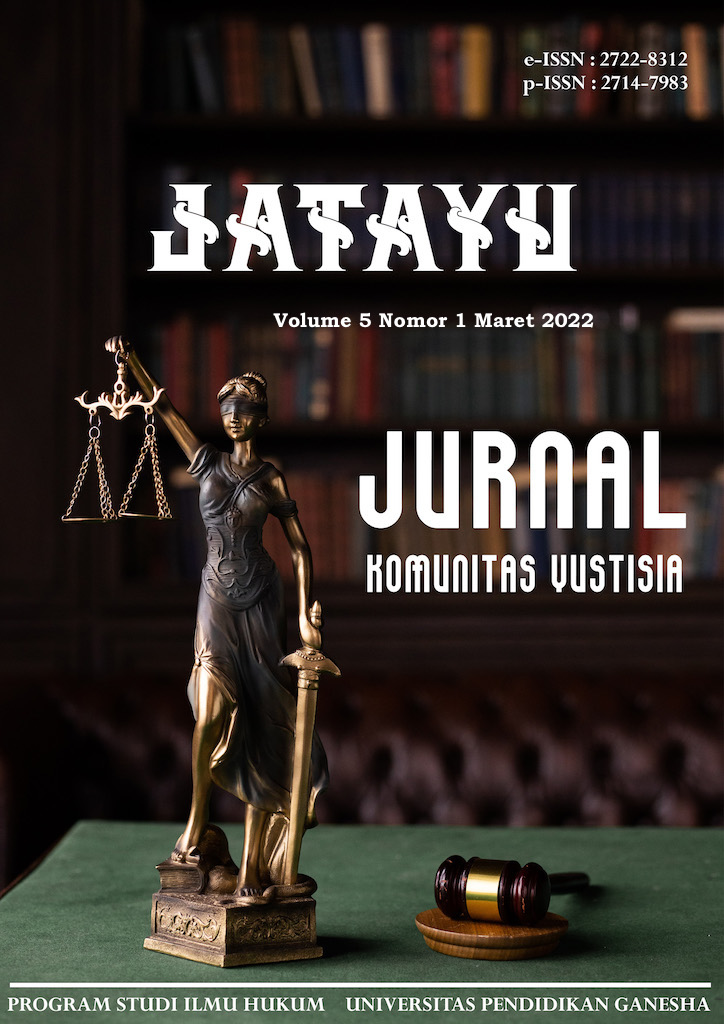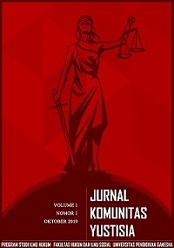JUSTIFIKASI PENERAPAN PRINSIP PERMANENT SOVEREIGNTY OVER NATURAL RESOURCES DALAM PERDAGANGAN INTERNASIONAL
DOI:
https://doi.org/10.23887/jatayu.v5i3.56398Keywords:
prinsip permanent sovereignty over natural resources, perdagangan internasional, pembatasan ekspor bijih nikelAbstract
Kedaulatan negara merupakan prinsip terpenting dalam hubungan dan kerja sama internasional. Adanya kebijakan Indonesia terkait pelarangan ekspor bijih nikel ke pasar Eropa telah menimbulkan gugatan dari Uni Eropa sebagai mitra dagangnya. Indonesia dianggap melanggar perjanjian internasional khususnya Pasal XI GATT. Sengketa perdagangan internasional ini diajukan ke WTO. Artikel ini akan membahas lebih dalam tentang bagaimanakah pengaturan prinsip permanent sovereignty over natural resources (PSNR) dalam hukum internasional dan bagaimanakah justifikasi Indonesia terkait penerapan prinsip PSNR dalam kebijakan pelarangan ekspor bijih nikel ke Eropa. Penelitian ini merupakan penelitian yuridis normatif dengan penelusuran kepustakaan untuk mendapatkan data sekunder sebagai data utama. Hasil penelitian menunjukkan bahwa prinsip PSNR merupakan jus cogens dalam hukum internasional. Prinsip ini menjadi dasar penegakan kedaulatan negara untuk mengelola, memanfaatkan, dan mengatur sumber daya alamnya. Nikel adalah sumber daya alam yang tidak dapat diperbarui. Kebijakan pelarangan ekspor nikel Indonesia adalah hak Indonesia untuk mengelola sumber daya alamnya, melindungi lingkungan dalam kerangka pembangunan berkelanjutan, dan untuk kesejahteraan rakyat Indonesia terutama generasi mendatang. Hal tersebut sesuai dengan prinsip PSNR.
Downloads
Published
Issue
Section
License

This work is licensed under a Creative Commons Attribution-ShareAlike 4.0 International License.
Authors who publish with this journal agree to the following terms: Authors retain copyright and grant the journal right of first publication with the work simultaneously licensed under a Creative Commons Attribution License that allows others to share the work with an acknowledgement of the work's authorship and initial publication in this journal. Authors are able to enter into separate, additional contractual arrangements for the non-exclusive distribution of the journal's published version of the work (e.g., post it to an institutional repository or publish it in a book), with an acknowledgement of its initial publication in this journal. Authors are permitted and encouraged to post their work online (e.g., in institutional repositories or on their website) prior to and during the submission process, as it can lead to productive exchanges, as well as earlier and greater citation of published work (See The Effect of Open Access). Authors who publish with this journal agree to the following terms: Authors retain copyright and grant the journal right of first publication, with the work [SPECIFY PERIOD OF TIME] after publication simultaneously licensed under aCreative Commons Attribution License that allows others to share the work with an acknowledgement of the work's authorship and initial publication in this journal. Authors are able to enter into separate, additional contractual arrangements for the non-exclusive distribution of the journal's published version of the work (e.g., post it to an institutional repository or publish it in a book), with an acknowledgement of its initial publication in this journal. Authors are permitted and encouraged to post their work online (e.g., in institutional repositories or on their website) prior to and during the submission process, as it can lead to productive exchanges, as well as earlier and greater citation of published work (See The Effect of Open Access).






